Growing academically and personally through undergraduate research
In many ways, the Vanderbilt undergraduate experience is a unique one. One example is in the unparalleled, hands-on research opportunities that students have from the moment they step onto campus.
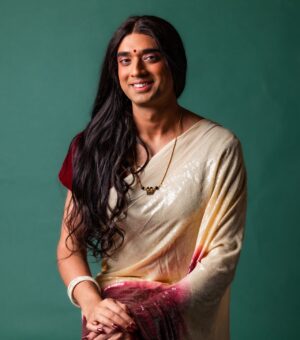
Undergraduate research is a defining experience at Vanderbilt, providing students the opportunity to think critically, apply their knowledge, and engage in the scientific process. However, students also grow in unexpected ways beyond just technical skills they learn in the lab.
Assistant Professor of Physics Raghav (Rithya) Kunnawalkam Elayavalli understands the value of providing students with hands-on research opportunities and is dedicated to this goal. In Kunnawalkam Elayavalli’s lab, students study the evolution of fundamental building blocks of nature, working on projects within three subcategories: theory model building, collider data analysis, and advanced artificial intelligence/machine learning model building.
“I think of student involvement in research as a crucial element of their education,” Kunnawalkam Elayavalli said. “While students are taking classes, doing homework, etc., they are often working on a structured problem set with a start and finish. Research, and often real life, is rarely like that.”
Students in the lab are not only conducting research on high-energy physics, but they are also developing the skills to communicate their progress, ask clarifying questions, and collaborate with team members.
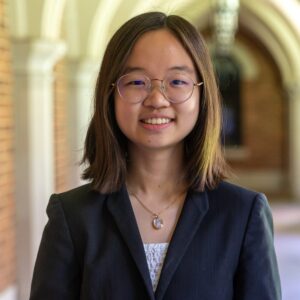
Rachel Koh, a sophomore double majoring in physics and computer science, analyzes simulations of collisions between protons to see what happens when you collide tiny particles together at incredibly high speeds and temperatures.
Koh said working in the lab has helped her hone computational and social skills that will be valuable in her future career.
“The people here are incredible and have helped me grow both as a person and physicist,” Koh said. “The experience has greatly helped me develop my theoretical understanding of quantum physics, the methodologies of physics research, and working together in a team on a computational project.”
Another student in the lab, Amanda Maeglin, simulates particle collisions in order to study the subatomic particles—called pions—that are produced.
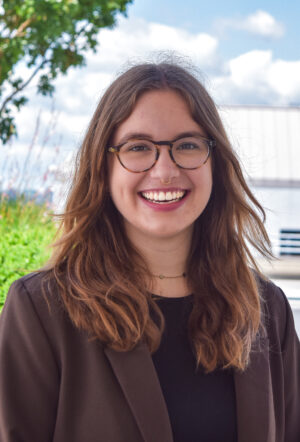
A senior triple majoring in physics, English, and communication of science and technology, Maeglin said working in the lab and having to regularly discuss each step of her process has helped her better understand her work and given her a comprehensive vocabulary to describe her research.
“The experience and exposure to the research process that I have gotten through working in this group has helped me learn not only how to work collaboratively on a research project but also has helped familiarize me with the process of research in general,” she said.
To further develop students’ communication skills, Kunnawalkam Elayavalli encourages all students to attend and present their research at conferences.
In January, Umar Sohail Qureshi and Junxing Sheng presented at the University of Illinois Urbana-Champaign conference, “Hot Jets: Advancing the Understanding of High Temperature QCD with Jets.”
Sohail Qureshi, a senior triple majoring in physics, mathematics, and computer science, uses machine learning and quantum field theory to analyze fundamental particles in the atomic nucleus and how they interact. He is involved in three projects in Kunnawalkam Elayavalli’s lab and has presented his research at numerous regional, national, and international conferences.
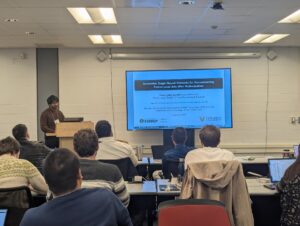
“The experience I’m gaining in the lab is invaluable for both my immediate academic goals and my long-term career aspirations in high-energy physics,” Sohail Qureshi said. “This research is building my technical skills and deepening my knowledge of high-energy physics and computational techniques. Presenting my work at conferences, creating posters, and preparing for journal publications are all integral experiences that solidify my foundation for future research in graduate school.”
Sheng, a senior double majoring in physics and mathematics, is studying the evolution of the building blocks of nature in heavy ion collisions. In addition to presenting at UIUC, Sheng has also presented his work at the University of North Carolina at Charlotte.
He said these experiences helped him better understand what the career of an academic researcher is like.
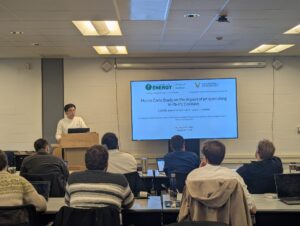
“From weekly meetings to attending conferences to self-learning to communicating with others, I had the chance to get a glimpse of my future as a Ph.D. student,” Sheng said. “Before this experience, I thought scientists just sit in their offices and think all day long. This experience made me re-think whether I would still like to go for an academic life, and the answer is still yes, but now I know what I will be facing once I choose this path.”
Working in the lab, students develop a variety of skills to prepare them to further their studies or enter the workforce. But while the students are learning and gaining new scientific skills, Kunnawalkam Elayavalli is also learning and growing by mentoring the students.
“I learn a lot from my students with each of them having differing expertise and approaches,” Kunnawalkam Elayavalli said. “In the task of mentoring, there is no one-size-fits-all, so it has been a goal of my mentoring to have a discussion with the students with regards to how they work, how they interact with the group, and how they expect to be mentored. Having students exposed to research during their undergraduate career is both an educational training of the student, and it prepares them for life ahead. Science, and society as a whole, benefits tremendously from diverse folks educated in the scientific method and who have a curiosity toward exploring nature.”
